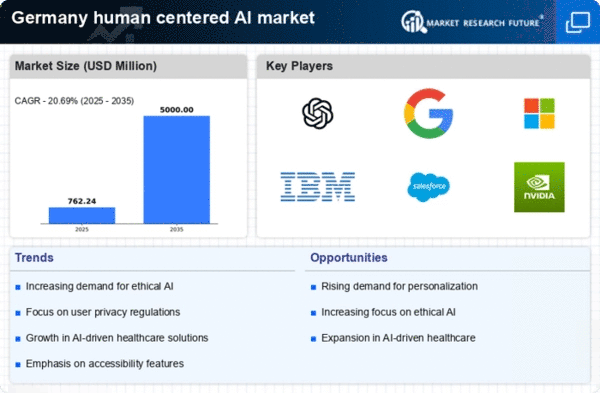Advancements in AI Technology
Technological advancements are playing a pivotal role in shaping the human centered AI market in Germany. Innovations in machine learning, natural language processing, and computer vision are enabling the development of more sophisticated AI applications that can understand and respond to human needs more effectively. For instance, the implementation of advanced algorithms has improved the accuracy of AI systems in various sectors, including retail and customer service. Market analysis indicates that the AI technology sector in Germany is projected to grow by approximately 15% annually, driven by these advancements. As organizations increasingly adopt these technologies, the human centered-ai market is likely to witness a corresponding increase in demand for solutions that prioritize user experience and engagement. This evolution may lead to a more integrated approach to AI, where technology and human interaction coexist harmoniously.
Rising Awareness of AI Ethics
Awareness of ethical considerations surrounding AI is gaining traction within the human centered-ai market in Germany. As consumers become more informed about the implications of AI technologies, there is a growing demand for transparency and accountability in AI systems. This shift is prompting companies to adopt ethical frameworks that prioritize user rights and data protection. Market data suggests that approximately 70% of German consumers are concerned about the ethical use of AI, which is influencing their purchasing decisions. Consequently, businesses that align their practices with ethical standards are likely to enhance their reputation and foster customer loyalty. This trend indicates that the human centered-ai market may evolve towards more responsible AI practices, ultimately benefiting both consumers and organizations.
Increased Investment in AI Startups
The human centered-ai market in Germany is benefiting from a significant increase in investment directed towards AI startups. Venture capital funding has surged, with reports indicating that investments in AI-related ventures reached €1.5 billion in 2025 alone. This influx of capital is fostering innovation and enabling startups to develop cutting-edge solutions that prioritize user-centric design. As these startups emerge, they are likely to challenge established players, thereby stimulating competition within the human centered-ai market. Furthermore, the focus on human centered approaches is becoming a key differentiator for investors, as they recognize the potential for sustainable growth in companies that prioritize user needs. This trend suggests that the human centered-ai market may continue to expand, driven by the innovative solutions brought forth by these newly funded enterprises.
Growing Demand for Personalized Solutions
The human centered AI market in Germany is experiencing a notable surge in demand for personalized solutions. As consumers increasingly seek tailored experiences, businesses are compelled to integrate AI technologies that prioritize user preferences and behaviors. This shift is reflected in market data, indicating that approximately 65% of German consumers express a preference for personalized interactions with AI systems. Companies that leverage human centered design principles are likely to gain a competitive edge, as they can better meet the evolving expectations of their clientele. Furthermore, the integration of AI in sectors such as healthcare and finance is anticipated to enhance service delivery, thereby driving growth in the human centered-ai market. This trend suggests that organizations focusing on personalization may see substantial returns on investment, potentially leading to a market expansion of over 20% in the coming years.
Collaboration Between Industry and Academia
Collaboration between industry and academia is emerging as a crucial driver for the human centered-ai market in Germany. Partnerships between universities and tech companies are fostering research and development initiatives that focus on user-centered AI solutions. These collaborations are not only enhancing the quality of AI technologies but also ensuring that they are aligned with societal needs. Recent studies indicate that such partnerships have led to a 30% increase in innovative AI projects in the past year. As academic institutions contribute their expertise, the human centered-ai market is likely to benefit from a more robust pipeline of talent and ideas. This synergy between theory and practice may result in the development of AI systems that are not only technologically advanced but also socially responsible.
















